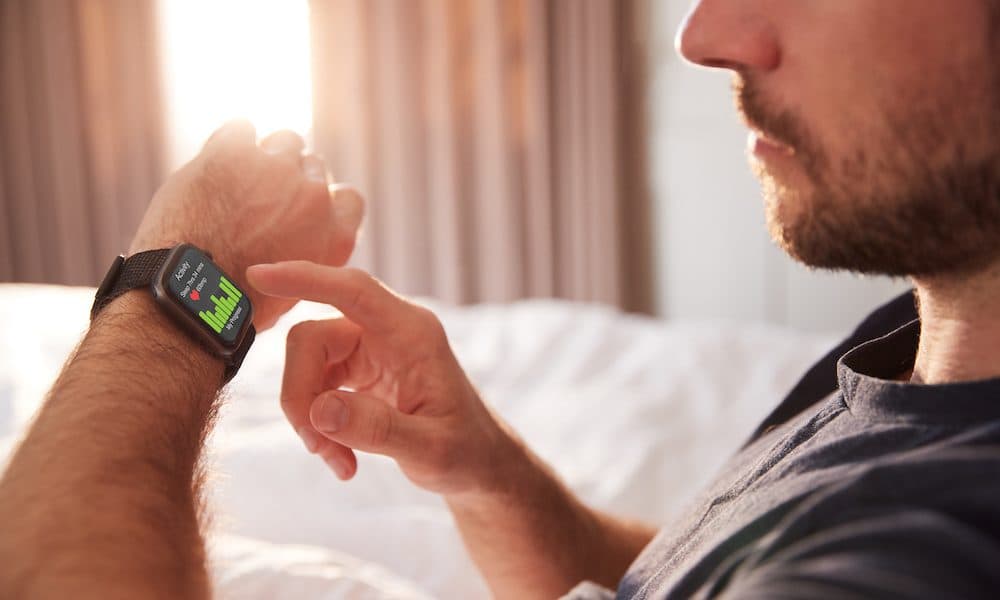
Wearable devices have revolutionised the industry of personalised healthcare. The accessories that you can wear on your wrists are now able to gather and transmit data about your body and behavior. Sounds a little scary, doesn’t it? However, such portable gadgets came in handy during the pandemic, when people were limited to their homes and weren’t able to see the doctor.
Wearable devices usually include smartwatches or bracelets that can monitor your heart rate, skin temperature, physical activity, etc. Thanks to the small sensors and built-in AI algorithms, they can provide real-time feedback and personalised insights into your health.
Some examples of devices designed specifically for health purposes include Apollo, TouchPoints, and Abilify MyCite among others.
The market for such devices is also growing — it has increased by over 8.5% over the last year and will continue to grow steadily in the foreseeable future. This also proves that digital health experts with wearables integration experience will be in demand in the following decade.
How wearable devices can help deal with stress
The most common use cases for wearable devices include fitness and activity tracking to promote physical health. However, such gadgets can also help deal with stress. After all, stress is a physiological reaction to events our brain perceives as challenges or even threats. Every time the brain thinks we are in danger, our body releases stress hormones like cortisol and adrenaline to help us cope. Our heart rate and blood pressure rise, we start breathing more rapidly, and our muscles tense up.
Wearable devices can track some of these changes by monitoring heart rate variability and galvanic skin response. HRV is one of the main indicators of stress, and gadgets can both notice some rapid changes, as well as a steady decrease or increase in the heart rate. Galvanic skin response is used to measure the electrical conductance of the skin, which changes during stress because of the sweat glands’ activity.
Several studies have shown amazing results regarding the effectiveness of wearable devices in identifying and managing stress. Some research has proven that the sensors are able to detect stress and identify its level in around 20 seconds! The device measured oxygen saturation, GSR, and body temperature with an accuracy of 97-99%.
How can wearable devices assist individuals in managing anxiety and depression?
Anxiety and depression are health conditions that can be caused by constant stress and worry. They can impact one’s mood, thoughts, and behavior. They, too, can be identified and even managed with the help of wearable devices. Unlike stress, these conditions are persistent, which is why measuring heart rate and galvanic response is not enough. Instead, they can be measured and analyzed using criteria like activity patterns, sleep quality, social interactions, etc.
Wearable accessories can also aid in the treatment of these conditions in several ways:
- Tracking sleep patterns and providing suggestions on the best time for waking up and going to bed.
- Monitoring physical activity and motivating to exercises by setting goals, reminders, and tracking progress.
- Setting alerts and reminders to engage in medication or attend therapy sessions.
- Suggesting mindfulness activities like breathing techniques, relaxation exercises, and affirmations.
- Helping in emergency situations by calling the designated person or a doctor in the event of acute stress.
Such functions add to the holistic approach to treating stress-related conditions and can help a person become more mindful and aware of their state.
How can wearable gadgets assist in improving wellbeing?
Wearable gadgets are a great help in times of stress and discomfort. But they can also bring more contentment and gratification to your life, enhancing your general well-being. They are able to do it through positive reinforcement by encouraging healthy habits like good sleep hygiene, a balanced diet, and exercise.
Such accessories can help track your calorie intake and remind you to have a meal; set goals for physical activities, so you can try to reach them; create schedules and prioritize tasks to decrease anxiety; track your progress in all your habits and even give out rewards. They have the potential to empower you and work towards a more proactive approach to your health and well-being.
Some studies have shown that people using wearable devices tend to reach the recommended level of physical activity more often than those who don’t use them. Others revealed a positive effect that wearables have on people with chronic diseases. These facts prove that smart accessories can increase overall well-being and promote a healthier lifestyle.
What are the constraints and obstacles of wearable gadgets for mental health?
Although wearable devices have proven helpful for coping with stress and anxiety, there are still some concerns that can prevent people from using them:
- Data security issues or data leakage
- Reliability in assessing physical factors
- Lack of clinical validation of such devices
- Need for user engagement for them to work
- Ethical considerations of their use for mental health
- Affordability and accessibility to a wider audience
Of course, no such devices should be used to diagnose illnesses like depression and choose self-treatment strategies. Also, data privacy rules like 2FA should be employed to avoid illegal data usage, and validation methodologies must be utilized to confirm the insights. That’s why it’s important to consult a professional before using such devices and amalgamate them with other forms of care to ensure a holistic approach.
In conclusion
To summarise, wearable devices can bring a lot of positive changes to physical and mental health and overall wellbeing.
They are able to identify stress and anxiety by measuring body temperature, heart volatility, and galvanic skin response.
Moreover, they can act as positive reinforcement for healthy habits like mindfulness and breathing techniques, maintaining physical activity, and ensuring good sleep.
It’s even been evidenced by different studies that wearable devices can mitigate the effects of chronic diseases. All of this makes them a great choice for people looking to adopt a more mindful and holistic approach to life.



